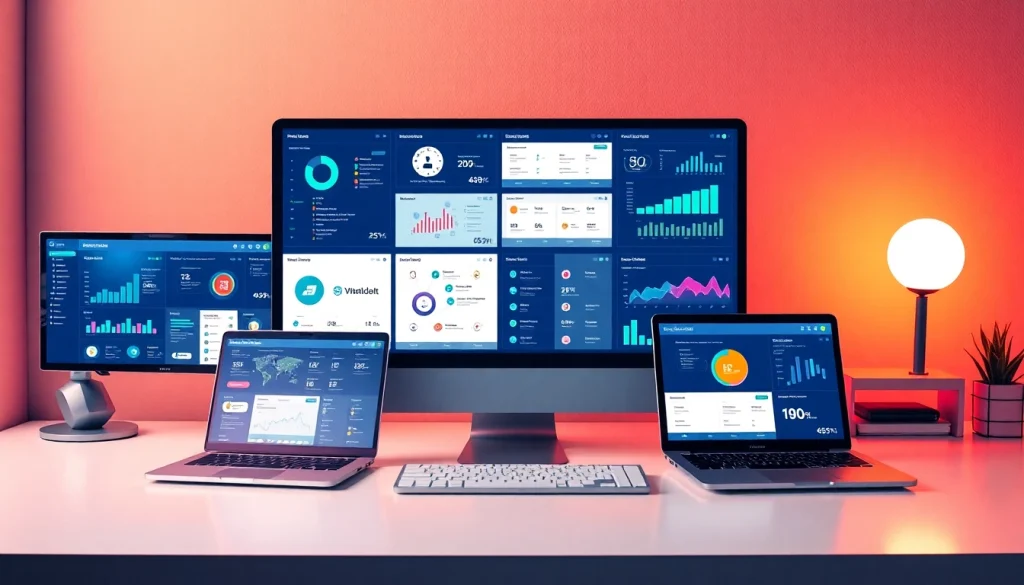
Introduction to AI Marketing Tools
In the rapidly evolving landscape of digital marketing, businesses are continually seeking innovative strategies to enhance their performance and connect with audiences more effectively. One of the game-changers in this domain is the proliferation of AI marketing tools. These tools harness the power of artificial intelligence to automate tasks, analyze data, and generate content, significantly improving productivity and marketing outcomes. In this comprehensive guide, we delve into what AI marketing tools are, their importance, benefits, and features, and provide insights on choosing the right tools for your business needs.
What are AI Marketing Tools?
AI marketing tools are software applications that utilize artificial intelligence algorithms to aid in marketing activities. These tools can perform various functions, such as automation of marketing tasks, data analysis, customer engagement, and content creation. AI tools can analyze vast amounts of data to derive insights, understand customer behavior, and ultimately make informed marketing decisions. From chatbots and predictive analytics to personalized marketing and content generation, these tools are designed to streamline marketing processes and enhance strategies.
Importance of AI in Modern Marketing
The significance of AI in marketing cannot be overstated. As consumers become more tech-savvy and their expectations evolve, businesses need to adapt to provide superior customer experiences. AI enables marketers to offer personalized recommendations, segment audiences more precisely, and optimize campaigns based on data-driven insights. By doing so, companies can improve engagement, enhance brand loyalty, and drive conversions while saving time and resources.
Benefits of Using AI Marketing Tools
The adoption of AI marketing tools comes with numerous benefits. Here are some of the most notable:
- Enhanced Efficiency: Automation of repetitive tasks frees up valuable time for marketing teams, allowing them to focus on strategic planning and creative initiatives.
- Data-Driven Insights: AI tools analyze customer data to deliver actionable insights, helping businesses to refine their marketing strategies based on real-time information.
- Improved Customer Targeting: By leveraging AI algorithms, businesses can effectively segment their audience and create tailored marketing campaigns that resonate with specific demographics.
- Content Generation: AI can create personalized content, saving marketers the time and effort required for traditional content generation.
- 24/7 Availability: Tools like chatbots can engage customers round-the-clock, addressing queries and facilitating immediate support.
Key Features of Effective AI Marketing Tools
Automation and Efficiency
One of the hallmark features of AI marketing tools is their robust automation capabilities. By automating repetitive tasks such as email marketing campaigns, social media posting, and customer interactions, businesses can streamline their operations. For instance, tools like Mailchimp and HubSpot automate email responses based on user behavior, drastically reducing the time spent on manual tasks.
Data Analytics Integration
For marketers, data is invaluable. AI marketing tools are equipped with powerful analytics features that can assess user engagement, conversion rates, and customer journeys. This data-driven approach helps marketers fine-tune campaigns for maximum impact. Tools such as Google Analytics and SEMrush provide deep insights into website performance and user behavior, enabling marketers to make adjustments that lead to better results.
Content Creation Capabilities
Content is still king in the digital marketing realm. With advancements in natural language processing, AI tools are capable of generating high-quality content that is coherent and relevant. Platforms like Jasper (previously Jarvis) leverage AI to assist marketers in crafting compelling copy, while tools like Canva utilize AI to streamline graphic design processes, making it easier to create engaging visuals for campaigns.
Top AI Marketing Tools Available Today
Overview of Popular AI Tools
With numerous AI marketing tools available, it’s essential to understand which ones stand out in terms of features and effectiveness. Below is an overview of some of the leading tools in the market:
- Jasper: Known for its content creation capabilities, Jasper uses AI to write marketing copy, blogs, social media posts, and more.
- HubSpot: A leading CRM platform that integrates AI for data-driven insights, customer segmentation, and automated marketing solutions.
- SEMrush: A comprehensive SEO tool that leverages AI for keyword research, competitive analysis, and market insights.
- Canva: A design tool that uses AI to help users create stunning visuals effortlessly, perfect for social media and marketing campaigns.
- Mailchimp: An email marketing tool that automates campaigns and utilizes AI to analyze subscriber data for targeted marketing.
Features Comparison
When selecting an AI marketing tool, businesses should compare features to ensure alignment with their needs. For example:
| Tool | Primary Features | Strengths |
|---|---|---|
| Jasper | AI content generation | High-quality copy; user-friendly interface |
| HubSpot | CRM, email automation, analytics | Comprehensive platform; excellent support |
| SEMrush | SEO optimization, competitor analysis | Robust analytics; extensive keyword database |
| Canva | Graphic design automation | Easy to use; vast template library |
| Mailchimp | Email marketing automation | Scalability; powerful analytics |
User Testimonials
User feedback can provide valuable insights into the effectiveness of AI marketing tools. Here are a few testimonials:
“Jasper has completely changed the way we create content. What used to take hours now takes minutes!” – Marketer at a leading startup
“HubSpot’s ability to analyze our customer data has transformed our approach to targeted marketing.” – Director of Marketing, eCommerce firm
“The design options in Canva are amazing! It makes producing marketing materials a breeze.” – Social Media Manager, nonprofit organization
How to Choose the Right AI Marketing Tool
Assessing Your Business Needs
Before selecting an AI marketing tool, it is crucial to assess your organization’s specific needs. Understand what problems you aim to solve. Do you need better customer segmentation? Are you struggling with content creation? By identifying your priorities, you can narrow down the options to those that best match your requirements.
Evaluating Tool Compatibility
Compatibility with existing systems is another vital consideration. Ensure that the AI tool you choose can seamlessly integrate with your current tools and platforms, such as your CRM, email marketing software, or content management systems. This integration ensures a smooth workflow and eliminates disruptions.
Case Studies of Successful Implementations
Examining case studies can provide valuable insights into how other businesses have successfully implemented AI marketing tools. For instance:
- Company A: A SaaS provider that integrated HubSpot saw a 50% increase in lead conversions within six months, thanks to improved segmentation.
- Company B: An eCommerce retailer utilizing Jasper to generate product descriptions reported a 30% increase in organic traffic due to optimized content.
- Company C: A digital agency using Mailchimp for automated email campaigns noted a 40% increase in click-through rates due to personalized messaging.
Future Trends in AI Marketing Tools
Innovations to Watch in 2025
As technology continues to evolve, so too will AI marketing tools. Here are a few innovations to look for in the coming years:
- Greater Personalization: Expect to see increased capabilities in AI that allow for hyper-personalized marketing experiences, driven by consumer behavior analysis.
- Voice Search Optimization: With the rise of voice-activated devices, AI tools will enhance capabilities for optimizing content for voice search queries.
- Real-Time Analytics: Advances in AI will allow marketers to access real-time data analytics more efficiently, enabling quicker decision-making.
- AI-Driven Predictive Analysis: Sophisticated algorithms will enable marketers to predict customer preferences and trends before they emerge, giving businesses a competitive advantage.
The Role of AI in Customer Experience
AI is revolutionizing customer experience by facilitating personalized interactions. Tools will become increasingly adept at understanding individual preferences, allowing businesses to tailor their approaches. Whether through chatbots providing instant support or recommendations based on user history, the customer experience will be richer and more satisfying.
Preparing Your Strategy for AI Adoption
To successfully integrate AI marketing tools into your strategy, preparation is key. Begin by educating your marketing team on AI fundamentals, and establish clear goals for what you want the tools to achieve. Gradually implement tools and monitor their impact, making adjustments where necessary to optimize their performance. Embracing change and staying abreast of AI trends will position your business for future success.
Conclusion
AI marketing tools are no longer just optional but essential components of modern marketing strategies. By understanding their capabilities and how to leverage them effectively, businesses can achieve remarkable results. From enhancing efficiency and data analysis to improving customer engagement and personalization, the benefits are profound. As we look to the future, being equipped with the right AI tools will empower marketers to navigate the complexities of the digital landscape and drive sustained growth for their organizations.






